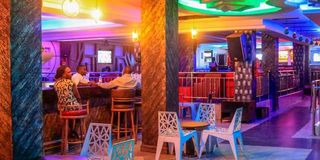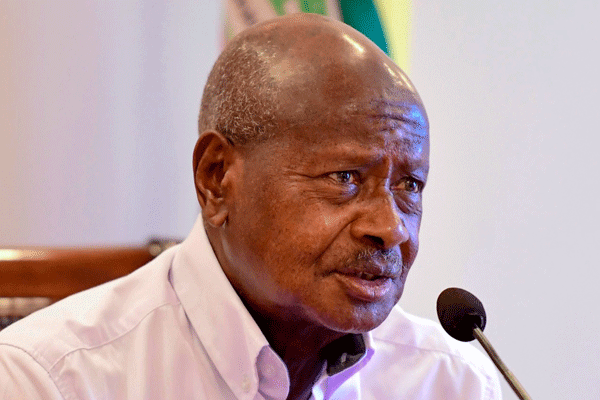Kampala back to its partying ways like it's 2019

Rios Bar and Restaurant in Kampala, a popular hangout, was renovated ready for reopening. PHOTO | MORGAN MBABAZI | NMG
What you need to know:
- On the first night of reopening, Ugandans were evidently thrilled to return to night time partying. Most city bars and nightclubs – which lured clients with free performances by local musicians – were packed to the rafters.
- Most high-end bars in town are only happy to be open again after a long hiatus, and requiring owners to implement Covid-19 health protocols seems to be asking for too much.
- Like everywhere else in the world, the Covid-19 pandemic was catastrophic to Kampala’s night-time economy as a large portion of the nightlife ecosystem simply died.
Kampala, Uganda’s capital and East Africa’s high octane entertainment centre, roared back to life, as the government removed restrictions that barred all social and night life.
On the first night of reopening, Ugandans were evidently thrilled to return to night time partying. Most city bars and nightclubs – which lured clients with free performances by local musicians – were packed to the rafters as revellers celebrated the return to nightlife in droves after two years of imbibing in seclusion and virtual partying.
At Levels, a popular social hangout in the city that previously hosted the weekly comedy show dubbed Comedy Store which is headlined by local comedian Alex Muhangi, fans turned up in big numbers on the opening night after the lifting of nightlife restrictions, perhaps buoyed by the presence of singer Bebe Cool who performed at no extra cost. The show was sold out, speaking to the drought of entertainment and social engagements suffered by Ugandans.
It was however opposite for small bars, locally known as bufunda, which had been operating illegally during the lockdown. They suffered low patronage in the first days of the resumption of night life as their usual patrons trooped uptown to the main street venues for more and better action.

Patrons at the Gonzaga Munnamasaka Bar and Pork Joint in Bulaga, Wakiso district, on Mityana Road. PHOTO | MICHAEL KAKUMIRIZI
Brenda Nakito, who runs a small bar in Wandegeya, a Kampala suburb, said that on the first day of opening, she closed at 10pm after her clients had abandoned her for the glitzier bars.
Most high-end bars in town are only happy to be open again after a long hiatus, and requiring owners to implement Covid-19 health protocols seems to be asking for too much.
Even though the police said they would be patrolling bars to enforce health protocols to maintain public health, they, too, seem to be exhausted. At the Los Angeles Palace in Kawempe, one of the biggest and popular bars in Kampala, revellers returned enmasse, with sanitisers and masks, but throwing all other caution to the wind even as the police hovered.
Like everywhere else in the world, the Covid-19 pandemic was catastrophic to Kampala’s night-time economy as a large portion of the nightlife ecosystem simply died. It’s estimated that about 80 percent of the high-end bars and nightclubs closed shop after the lockdown pushed them over the edge financially.
The pandemic saw the cancellation of all live performances and most affected were the national and international annual events. Foreign performers and revellers had to cancel travel to Uganda and the entertainment calendars were frozen indefinitely. The opening has excited all spheres of the entertainment and hospitality sectors.
Night economy
Derek Debru, co-director of the Nyege Nyege International Music Festival said; “By opening up the night economy many people will get their jobs back, while others will finally find some time to relax and see friends, artists will go back to performing and industries such as the beverage industry and the events industry will be able to get back on their feet.”

Jazzville pub during the fun night days before pubs were closed. PHOTO | MORGAN MBABAZI | NMG
Saying certainly that the Nyege Nyege International Music Festival will resume this year Mr Debru said: “2022 will mark our sixth edition, unless we count our hybrid edition of 2020. In September 2022, it will be three years since the last festival, that means that we will pull all the stops to make this the greatest edition to date, to reward fans that have stayed with us over the years and to celebrate our growing community of music and art lovers. This year Nyege Nyege will be very special.”
He was however quick to add that “Health and safety of all attendees is Nyege Nyege is of utmost priority, and we will work with government health officials to apply all necessary measures. Measures can change over time depending on the situation, from demanding the vaccination certificate to keeping smaller numbers indoors, providing hand washing facilities and making the mask compulsory indoors, it all depends on how present the virus will be in September.” September is the official calendar month of the festival.
He said it all depended on “the type of event, there’s a chance that things will head towards more exclusive events, with less people and more safety, but that will affect ticket prices. Chances are we will also gear up to more boutique events, smaller in size but bigger in quality,” Mr Debru added on post-coronavirus festivals.
Among other live events lined up this year include the Reggae Fest 2022 that organised by the Bayimba Foundation on Lunkulu Island in Buikwe district from February 5-6.
The Jam Fest meanwhile is set for February 19 in Lugogo, Kampala.
The Janzi Band will resume its Thursday gigs at the Kush Lounge in Kampala and the Comedy Store will be at its new home, at Levels Lounge, Kampala, every Monday.
On the live band scene, Afrigo Band’s Chief Executive James Wasula, said: “It is a welcome step for the income-starved performers. Even when opportunities arose such as weddings, we could not perform as no one hired us because of the limitations on the number of people attending such events. This has been the worst situation we have experienced as entertainers.”
He also decried the health regulations limiting number of people at events, saying events with few people do not make economic sense for the entertainment industry in the long run. “This will not be commercially viable in the long run. Strategies will have to be devised because where this is challenge you find a solution to it. So, this is a learning process and we shall find ways of keeping ourselves afloat.”
Afrigo, Uganda’s top band used to hold weekly gigs at Little Flowers on Bombo Road, Kampala prior to the pandemic and Mr Wasula says the band will resume gigs but “we want to go slow as we monitor the situation. Instead of performing every weekend we are going to space our performances. And the band members will undergo regular Covid tests because we are going to be interacting with people.”
New normal
Everyone agrees that it was about time normal life resumed, or at least some semblance of a new normal that would boost the economy in general.

As nightlife resumed in Uganda, social hangout venues were spruced up, ready to receive clients. PHOTO | MORGAN MBABAZI | NMG
Onapito Ekomoloit, Nile Breweries Ltd’s legal and corporate affairs director said allowing for nightlife was a “major shot in the arm for a key sector of the economy that had come to a virtual halt.”
Commenting on the supply and sale of alcohol under these new circumstances, Ekomoloit said “I think many Ugandans are now compliant with the Covid regulations such as masks, so I am confident numbers will move fast to near full capacity.”
However, even as the nightlife scene rides the wave, the typical all-night partying of Kampala may not return to pre-Covid-19 times immediately as the sector still faces some restrictions.
For instance, anyone hanging out at entertainment venues is required to produce proof of vaccination, and management must implement other regulation as ordered by President Museveni.
But all these remain to be seen as fewer than 10 percent of Ugandans have been fully vaccinated – and taking alcohol always results in the kind of excitement that makes it impossible for revellers to be cautious.
“It is important that we carefully manage the re-opening in the safest possible way,” said Police spokesman Fred Enanga, in a statement dated January 24.
A major support to the nightlife economy is the transport sector, served by boda bodas (motorcycle taxis) and which much to the chagrin of revellers’ are still subject to the 7pm curfew until further notice.
“All revellers must be keen and take into consideration their travel arrangements when moving at night.
''This is because the movement of boda bodas is still restricted from 5.30am to 7pm,” Mr Enanga said.
“Our security officers will be on the roads to hunt for boda bodas defying the curfew. If you are going out in the night, please use cars,” Mr Enanga said.
Boda bodas are the preferred mode of transport because they are cheaper, faster and convenient.
NBL’s Ekomoloit, said, “It is untenable and I think the president has already spoken of getting more guidance from the Scientific Advisory Committee.”
The absence of boda bodas on the roads will restrict more people to party in their smaller neighbourhood bars, denying popular hangouts uptown the much-needed clientele as everyone seeks to rebuild their businesses.
The E-Trade Association of Uganda, an umbrella body for digital job creators has called on the government to ease Covid-19 restrictions on boda bodas, saying the sub-sector employs over 1.2 million people.






